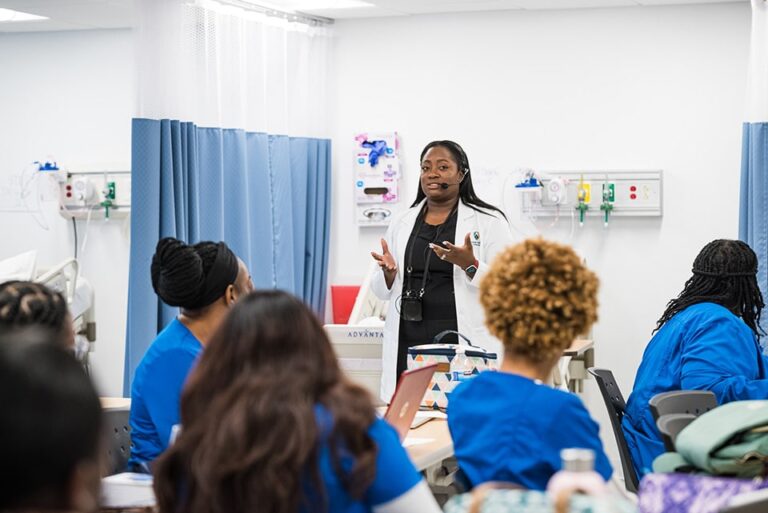Are you interested in a career in nursing? Because a Bachelor of Science in Nursing prepares nurses with more comprehensive training than an associate or certificate program, a BSN is required for some employers as an entry-level requirement and is often a requirement for career advancement.1
BSN-prepared nurses not only graduate with a solid liberal arts foundation but also with an understanding of healthcare leadership, evidence-based nursing practice, research, and health policy. Earning your BSN can be the best way to ensure that you have the skills and training you need for the most successful nursing career.
The State of Nursing in Dallas, Texas
Much like the rest of the United States, Dallas is experiencing a nursing shortage that is projected to grow over the next decade. This demand makes it a great time to consider joining the nursing field.
Data from O*Net online estimates projected job growth for registered nurses in Texas at 17% from 2020-2023 with annual job openings at 16,210. This estimate far exceeds the national projected nurse job growth average at 6%.
If you are considering joining the nursing profession, obtaining a BSN will not just prepare you for the transition to entry-level practice but also make you marketable to potential employers in the job market.
Overview of Arizona College of Nursing’s 3-Year BSN Program
Most BSN programs take 4 years of full-time study to complete because of the extensive foundational and nursing coursework required of these programs. A 3-year BSN program may appeal to those seeking a path to becoming a BSN-prepared nurse in a shorter time frame.
Arizona College of Nursing offers a 3-year BSN program that does not sacrifice rigor or quality and is accredited by the Commission on Collegiate Nursing Education (CCNE). CCNE accreditation means Arizona College of Nursing’s faculty is committed to student success and the highest professional nursing practice and education standards.
This full-time plan of study spans three years, and each year is broken down into three semesters.
Year-by-Year Breakdown of the 3-Year BSN Program
Year 1
Year one students complete foundational and general education courses.
In the first semester, students take biology, psychology, and college mathematics classes. Second semester students move on to Anatomy and Physiology I and II as well as a politics course. Students will also complete a writing course. Wrapping up the year, semester three students take statistics, chemistry, human development, and a diversity and global health class.
Year 2
In the second year of study, students begin to transition into nursing core courses as they have completed their general education requirements.

Year 3
Lastly, in year three, students spend most of their time engaging in clinical learning experiences and direct patient care.
Clinical courses are divided into community health nursing, acute and chronic health, maternity, and pediatrics throughout the year. In addition, students finish pharmacology, evidence-based practice, and leadership courses. In the final semester, semester nine, students also take courses dedicated to transitioning to nursing and a professional seminar.
What Sets Arizona College of Nursing’s 3-Year BSN program in Dallas, Texas apart?
Arizona College of Nursing’s 3-year BSN program provides various tools and resources to students to ensure that the educational experience is high quality and student-centered.

Furthermore, our leading-edge skills laboratory allows students to practice and refine psychomotor skills essential to nursing practice.
In addition, the program places a significant emphasis on ensuring preparation for board examination, also known as the NCLEX examination. All nurses must pass this exam to transition to practice. In fact, preparation for this culminating licensing exam begins on day one of the program, and students are continually supported through their time in school with practice questions, exam strategizing, as well as a class dedicated entirely to preparing for the NCLEX.
Conclusion
While there are many ways to enter the field of nursing, pursuing a program that awards a BSN degree offers the most opportunity. This degree not only prepares entry level nurses with critical skills in leadership, evidence-based practice, and health policy, but also helps new registered nurses stand out from other job seekers. It is a highly valuable credential and a gateway to rewarding professional opportunities as a registered nurse.
If you are interested in Arizona College of Nursing’s 3 year BSN program, you can find more information here. Additionally, if you have taken general education college courses at another institution, you may be eligible for college credit transfer. The nursing program also accepts students who are transferring nursing schools. Please reach out the college for details about transferring and qualifications.
Author Bio
Tana Bao MSN, FNP-BC, NP-C, APRN
Tana Bao is an experienced advanced practice registered nurse. She earned her BSN from The University of Massachusetts Amherst in 2016 and her MSN from Thomas Jefferson University in 2019. She is board certified to practice as a family nurse practitioner with both The American Academy of Nurse Practitioners (NP-C) and The American Nurses Credentialing Center (FNP-BC). Clinically, she has worked in various medical settings including family planning, women’s health, sleep medicine, and primary care. She now also writes professionally as a health content writer and journalist and is also pursuing a post master’s certificate in nursing education.
Start Your Future in Nursing Today

Why Choose Arizona College of Nursing?
- Earn a BSN degree in 3 years or less with eligible transfer credits
- Campus locations throughout the US
- Night classes for general education courses
- Hybrid Online/In-Person format for general education classes
- Nursing education is all we do
- CCNE-Accredited Program*
- NCLEX-RN success coaches and exam preparation class
- Financial aid available to those who qualify
Discover Your Path to a Career in Nursing
Citations
- Bureau of Labor Statistics, How to Become a Registered Nurse.
- O*NET OnLine, Texas Employment Trends Registered Nurses.
Information in this post is accurate as of .
*The Bachelor of Science in Nursing (BSN) degree program at Arizona College of Nursing is accredited by the Commission on Collegiate Nursing Education (https://www.aacnnursing.org/). All Arizona College of Nursing and Arizona College campuses are institutionally accredited by the Accrediting Bureau of Health Education Schools (https://www.abhes.org/), a U.S. Department of Education-recognized national accrediting agency.

